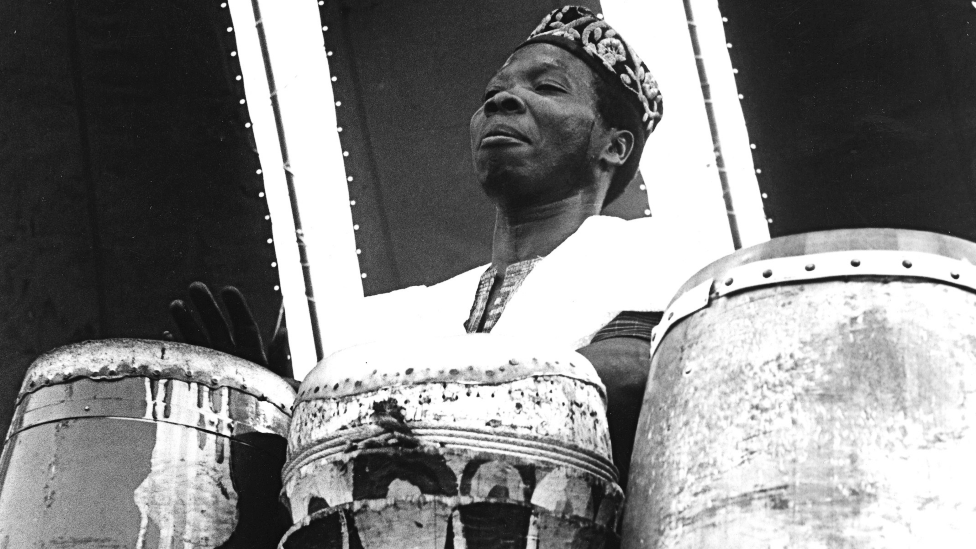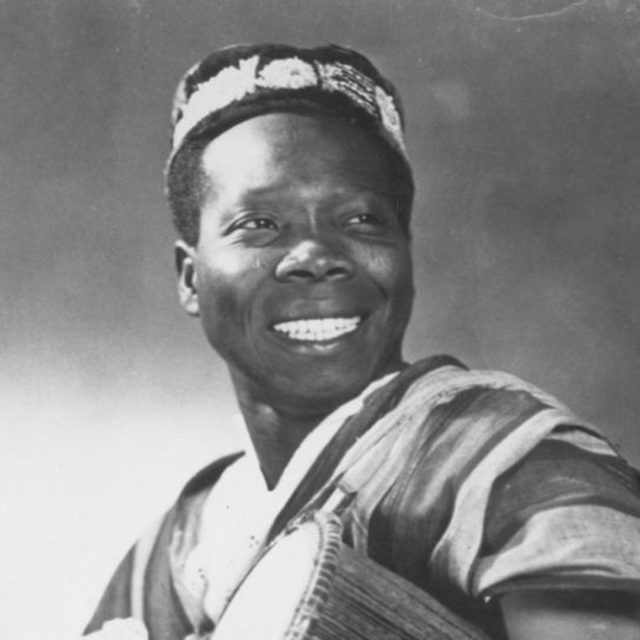 Michael Babatunde Olatunji (born April 7, 1927 – April 6, 2003) was a Nigerian drummer, educator, social activist, and recording artist.
Michael Babatunde Olatunji (born April 7, 1927 – April 6, 2003) was a Nigerian drummer, educator, social activist, and recording artist.
Babatunde Olatunji Biography
Olatunji was born in the village of Ajido, near Badagry, Lagos State, in southwestern Nigeria. A member of the Yoruba people, Fon people, and the Awori tribe (a Yoruba subethnic group), Olatunji was introduced to traditional African music at an early age. His name “Bàbátúndé means “father has returned,” because he was born two months after his father, a Yoruba, Zannu Lofinda Olatunji, died, and Olatunji was considered to be a reincarnation, known as atúnwa in Yoruba language. His father was a local fisherman who was about to rank to the rise of chieftain, and his mother was a potter who was a member of the Fon people. Olatunji grew up speaking the Fon language and the[Yoruba language. His maternal grandmother and a great-grandmother was a priestess of the Vodun and Yoruba religions, and they worshipped the orisha, such as Kori, the goddess of fertility. Because of his father’s premature death, from an early age he was groomed to take the position as chief. When he was 12, he realized that he did not want to become a chieftain. He read in Reader’s Digest magazine about the Rotary International Foundation’s scholarship program, and applied for it. He went to the United States of America in 1950.
 Education
Education
Olatunji received a Rotary scholarship in 1950 and was educated at Morehouse College in Atlanta, Georgia, where he desired to, but never sang in the Morehouse College Glee Club. Olatunji was a good friend of Glee Club director Dr. Wendell P. Whalum and collaborated with him on a staple of the choir’s repertoire, “Betelehemu”, a Nigerian Christmas carol. After graduating from Morehouse, he went on to New York University to study public administration. There, he started a small percussion group to earn money on the side while he continued his studies.
 Musical career
Musical career
After hearing Olatunji perform with the 66 piece Radio City Music Hall orchestra Columbia Records A&R man John Hammond signed Olatunji to the Columbia label in 1957. Two years later he released his first of six records on the Columbia label, called Drums of Passion. Drums of Passion became a major hit and remains in print; it introduced many Americans to world music. Drums of Passion also served as the band’s name.
Olatunji won a following among jazz musicians, notably creating a strong relationship with John Coltrane, with whose help he founded the Olatunji Center for African Culture in Harlem. This was the site of Coltrane’s final recorded performance. Coltrane wrote the composition “Tunji” on the 1962 album Coltrane in dedication to him. Olatunji recorded with many other prominent musicians (often credited as “Michael Olatunji”), including Cannonball Adderley (on his 1961 African Waltz album), Horace Silver, Quincy Jones, Pee Wee Ellis, Stevie Wonder, Randy Weston, and with Max Roach and Abbey Lincoln on the pivotal Freedom Now Suite aka We Insist!, and with Grateful Dead member Mickey Hart on his Grammy winning Planet Drum projects. He is also mentioned in the lyrics of Bob Dylan‘s “I Shall Be Free” as recorded on the album The Freewheelin’ Bob Dylan.
In 1969, Carlos Santana had a major hit with his cover version of “Jin-go-lo-ba” from Olatunji’s first album, which Santana recorded on his debut album, Santana, as “Jingo”. Olatunji’s subsequent recordings include Drums of Passion: The Invocation (1988), Drums of Passion: The Beat (1989) (which included Airto Moreira and Carlos Santana), Love Drum Talk (1997), Circle of Drums (2005; originally titled Cosmic Rhythm Vibrations, with Muruga Booker and Sikiru Adepoju), and Olatunji Live at Starwood (2003 – recorded at the 1997 Starwood Festival with guest Halim El-Dabh. He also contributed to Peace Is the World Smiling: A Peace Anthology for Families on the Music for Little People label (1993).
Film and theatre
Olatunji composed music for the Broadway theatrical and the 1961 Hollywood film productions of Raisin in the Sun. He assisted Bill Lee with the music for his son Spike Lee’s hit film She’s Gotta Have It.
 Activism
Activism
Olatunji was known for making an impassioned speech for social justice before performing in front of a live audience. His progressive political beliefs are outlined in The Beat of My Drum: An Autobiography, with a foreword by Joan Baez, (Temple University Press, 2005). He toured the American south with Rev. Martin Luther King Jr. and joined King in the march on Washington.
When he performed before the United Nations General Assembly, Soviet Premier Nikita Khrushchev took off his shoes and danced. Later, he was one of the first outside performers to perform in Prague at Václav Havel’s request. On July 21, 1979, he appeared at the Amandla Festival along with Bob Marley, Dick Gregory, Patti LaBelle and Eddie Palmieri, amongst others.
Teaching career
Olatunji was a music educator, and invented a method of teaching and recording drum patterns which he called the “Gun-Dun, Go-Do, Pa-Ta” method after the different sounds made on the drum. He taught drum and dance workshops year-round starting in the late 1950s. Over the years he presented workshops nationally and internationally at colleges, universities, civic, cultural, and governmental organizations.
He co-wrote Musical Instruments of Africa: Their Nature, Use and Place in the Life of a Deeply Musical People with Betty Warner-Dietz (John Day Company, 1965). He taught a summer drumming and African dance course with his wife, at the Omega Institute in Rhinebeck, New York for many summers during Family week. He also taught at the Esalen Institute in California beginning in 1985.
Last years
In early 2000, Olatunji purchased a home in Washington, D.C. where he lived for a short time, along with his roommate, Professor Akinsola Akiwowo. There he was assisted by Jaqui MacMillan and Chris Stewart, before he sold the house and moved to California. For the few years before his death Olatunji made his home at the wild Big Sur coastline. He became a scholar-in-residence at the Esalen Institute. During this time, he already suffered severely from diabetes and was assisted by Nora Arjuna, Leo Thompson and Leon Ryan until shortly before his death in Salinas, California, in 2003 from diabetes, on the day before his 76th birthday. He was survived by his wife Amy, 4 children: Omotola Olatunji, Niyi Esubiyi (né Olatunji), Folashade Olatunji Olusekun, and Modupe Olatunji, 7 grandchildren, and a brother (some sources say cousin), Akinsola Akiwowo.
Awards
- Olatunji was part of Mickey Hart’s Planet Drum projects, including the album Planet Drum, which won the Grammy Award for Best World Music Album of 1991, the first year for which the award was given.
- He was an inductee into the Percussive Arts Society Hall of Fame in 2001.







